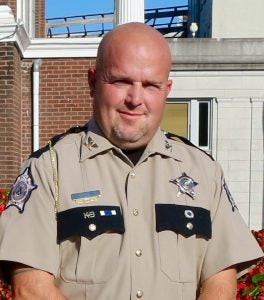Pension proposal could hurt ability to hire new law enforcement officers
Published 8:29 am Friday, November 24, 2017
While the state pension conversations have been mostly focused on Kentucky’s teachers, there are other groups that could be affected by changes, such as law enforcement officers.
 “We talk about the pension reform and a lot of people automatically think about teachers. But this is really affecting law enforcement officers also,” said Danville Police Chief Tony Gray. “Between teachers and law enforcement, this could seriously cause some damage to the state. You are talking about the educators and the protectors.
“We talk about the pension reform and a lot of people automatically think about teachers. But this is really affecting law enforcement officers also,” said Danville Police Chief Tony Gray. “Between teachers and law enforcement, this could seriously cause some damage to the state. You are talking about the educators and the protectors.
“The Commonwealth has an issue with drugs right now. An issue with trying to get literacy levels higher. This pension plan does not create an environment for people to look at these careers. And these are careers that are badly needed at this time.”
Most law enforcement officers, including deputies at the Boyle County Sheriff’s Office and officers at the Danville Police Department, get paid for “hazardous duty,” although some cities give officers non-hazardous duty pay. The differences in the two boil down to differences in benefits for officers and their families; agencies have to pay more into retirement benefits for hazardous duty officers.
The types of benefits state employees get is defined by whether they are classified as hazardous or non-hazardous duty. Then those classifications are further defined by three tiers based on when employees were hired, Gray said.

Derek Robbins, Boyle County Sheriff
People hired before Sept. 1, 2008 — including Boyle County Sheriff Derek Robbins and Gray — fall into tier one. Tier one hazardous duty officers can retire after 20 years of service or at age 55 or older, and they can receive 50 percent of what they earned on average during their three highest-paid years, along with defined benefits, Gray said.
“Those defined benefits are why a lot of people got into law enforcement,” Gray said. “My day and earlier, it was that the pay wasn’t very good starting out, but you were guaranteed certain benefits at the end of your career.”
Those hired between Sept. 1, 2008, and Jan. 1, 2014, fall into tier two, according to information from Kentucky Retirement Systems. Hazardous duty officers in tier two can retire after 25 years of service or age 60 or older, and they still receive a defined benefit plan.
Those hired after Jan. 1, 2014, fall into tier three. Hazardous duty officers can retire after 25 years or at age 60 or older, with hybrid retirement benefits. Gray said the benefits are similar to 401(k) retirement plans.
The new plan presented last month by Gov. Matt Bevin would keep future hires in a system similar to tier three. The plan maintains the retirement ages for tier one, two and three, but eliminates the eligibility for normal retirement at age 60 with 25 years of service.
The proposed plan initially included some unclear language relating to non-hazardous duty officers and line-of-duty deaths, but Bevin’s office did confirm that those officers’ families would receive benefits for line-of-duty deaths, the same as hazardous duty officers.
“The draft that’s in place right now, it doesn’t affect me that much,” Sheriff Robbins said. “But it affects anybody else who may want to be employed by the sheriff’s office in the future.”
Robbins said “you’re not the most popular person in the world when you’re in law enforcement.”
“It’s hard enough to attract good employees,” he said. “If you don’t have a pension system at the end of it that’s worth having, the quality of your employees is going to go down, the quality of your law enforcement’s going to go down.
“In turn, it’s going to — I think — create more problems in communities. You’re not attracting the same quality of people that you did in the past. There’s no promise at the end of your career that you’re going to be taken care of.”
Currently, Gray said, there’s a police officer shortage statewide. It takes a recruit about a year to get through the classes before they can be on the streets patrolling.
The Kentucky State Police has a shortage, Gray said, citing a Herald-Leader article, which said that KSP has 840 sworn officers, down from the 1,070 officers they are allotted to have.
“A lot of experienced officers are jumping and taking that. Most of the time, especially with agencies like us, they get better pay (at KSP),” Gray said. “… You have to compete for officers.”
Fears around the pension discussion have exasperated the shortage, Gray said — Louisville Metro Police Department, he said, had 75 officers retire in the month of July because of the “uncertainty” of the pension.
“A lot of people have probably pulled the plug that were (close to retirement),” he said.
Gray has been working for more than 22 years, meaning he could retire at any time. He said he plans on staying on for a while longer, to see his children through college. There are a few others in the Danville Police Department who are close to the 20-year mark and one other officer at 22 years of service; all of those are under the tier one level and are allowed to retire at 20 years. Nine officers will be able to retire in the next five years, Gray said.
Robbins is close to where he could retire, having served 20 years in law enforcement, but said he has no plans of doing so. There are four or five others in the department who are getting close or have passed the mark.
Some agencies attempt to fill those gaps with retired law enforcement officers. The Boyle County Sheriff’s Office has gone that route — there are seven or eight people, between court security and deputies, who have retired from law enforcement and have come to work for the Boyle County Sheriff’s Office.
“For small sheriffs offices being able to hire retired police officers, that’s like hitting a gold mine,” Robbins said. “Those are the people that you want to hire.”
The plans proposed would require those retirees to pay back into the system when they resume working, but they won’t get to benefit from it, Robbins said.
The biggest change is that currently, hazardous employees are not required to contribute to retiree health, but under the new system, employees would be required to contribute if they are rehired after retirement.
“I wouldn’t want to work somewhere after I retire where they’re going to take 3 to 6 percent of my take-home pay for someone else,” Robbins said.
This plan, Robbins said, would make it “tough” to attract retirees back.
Robbins said he thanks the governor for trying to fix a problem, but he thinks the plan is “putting the cart before the horse.”
“We need to create a revenue system to figure out how pay for it. Then, if we have to make adjustments to the pension system, go from there,” he said.
Robbins said he believes there are “too many things that need to be worked out,” and that everyone who will be impacted needs to speak up.
“Let (the legislators) know that you’re not OK with how that’s drafted, that there’s got to be some changes. And let them know what changes you want,” he said. “… Something’s got to be done, because it was neglected for 20 years, and there’s a lot of ground to make up.”






